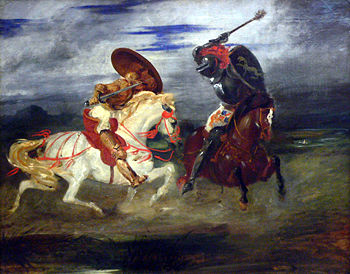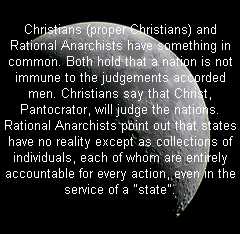Knights of the Desert
 Increasingly, I find dissidence and social resistance are considered, among the religious, to be either un-Christian, or somehow an unpleasant aspect of Christianity that is best swept under the rug along with keeping the fasts. Actually, fasting and resistance to the world, in fact open warfare with the world, are related. The very purpose of asceticism is to save us – from the world and unto God. So often, you’ll find those who don’t do one (e.g. fasting or resisting the world) don’t appreciate the other. I’ll be called judgmental for that, but I really don’t care – I only care, at this point, if it’s true. But what is true religion? To relieve the poor and keep oneself unstained by the world. Increasingly, I’m thinking that all of orthopraxy (or orthopraxis for you misguided sticklers) is summed up in that statement.
Increasingly, I find dissidence and social resistance are considered, among the religious, to be either un-Christian, or somehow an unpleasant aspect of Christianity that is best swept under the rug along with keeping the fasts. Actually, fasting and resistance to the world, in fact open warfare with the world, are related. The very purpose of asceticism is to save us – from the world and unto God. So often, you’ll find those who don’t do one (e.g. fasting or resisting the world) don’t appreciate the other. I’ll be called judgmental for that, but I really don’t care – I only care, at this point, if it’s true. But what is true religion? To relieve the poor and keep oneself unstained by the world. Increasingly, I’m thinking that all of orthopraxy (or orthopraxis for you misguided sticklers) is summed up in that statement.
The other day someone asked a personal question at coffee hour – namely, why I tendered my resignation at a particular company. I explained that I’m not a big fan of corporations and what they’ve done to the culture, the world of work, and people. I find they tend to create a climate of fear and compliance that’s antithetical to what I value. My boss tried to make me afraid and, when faced with an invitation to fear, I tend to break it. So I broke it; I handed in my resignation. You should have seen how people stiffened. You’d have thought I smacked the Bishop. Literally.
So what’s so radical about this? Before you go nitpicking it, I’m not an idiot – this is just one of many examples I could cite, across the interactions of many different kinds of people in many different religious environments. I’m not taking it personally, nor is it about anything personal. Not really. What I’m talking about is the perception that true religion is Mitt Romney, or at least religion should allow for it.
But I see genuine religion quite differently. I see it as much more similar to the placing of a Crusade on laymen-knights who have before them both an ascetic quest in the desert and a moral and ethical battle in the cities of the world. [Just to be clear, ethics is a science, based on those principles necessary to the survival first of the individual and, second, of the species. Morality is a revelation, something that requires a personal source and standard, a person or persons that are of the same image as the species or, more to the point, vice versa.]
Placed on us is not a commission to go forth and blend in, or go forth and adopt the world’s way of life, or go forth and invest your primary energies and essence into the world. Ours is a commission to go forth and do battle, call people out of the world while remaining within it (live in the desert in your own backyard), and defend the downtrodden, the exploited, the weak, and the oppressed. Religion (the kind I would criticize) is simply the translation of the world’s principles into liturgical language. True religion, the kind that is focused on relieving the poor and keeping oneself unstained by the world, is an ascetic warfare on the world and an ascetic conquest of the self, by which in both cases, we overcome the Evil One. True religion is not a sigh of frustration and defeat but a horn of challenge. As C.S. Lewis has said, Christianity is not defense but attack. We defend the weak, but we attack the dragon.
 One of the most basic forms of attack, that helps us solidify our sense of resistance and rejection of the world (imo), is boycotting. You can boycott fear in a workplace (like I did), or you can do it in defense of others.
One of the most basic forms of attack, that helps us solidify our sense of resistance and rejection of the world (imo), is boycotting. You can boycott fear in a workplace (like I did), or you can do it in defense of others.
Recently, I was at a restaurant and the manager was yelling furiously at an employee, taunting and threatening him. I walked to the cashier, canceled our order, and explained that I won’t do business with someone who abuses workers, tries to make them afraid, and attacks their dignity. The manager came up and apologized for doing it in public, and I explained that it’s even worse to do it in private, where he’s free from accountability. I cut them off for six months, because it is the duty of Christians to defend the weak, the poor, and the dignity of work and of mankind, and to resist evil and work toward its downfall.
Some months later, I was in a supermarket, and the manager was pacing the front of the store, screaming over a cell phone at an employee who wasn’t coming to work, telling her she was fired. I stepped to the counter and informed the clerk, in the full hearing of all, that the behavior was illegal and immoral. The manager had not only violated the rights of this worker, but had tried to use shame and fear as weapons, and to exude toughness and volatility in the midst of a culture that is already overflowing with it and awash in the resultant blood and violence.
A while back, Yahoo was handed a request by the Chinese government for information that would identify dissidents contributing to internet discussion that was critical of China’s government or form of government (i.e. corruption, abuse of power, exploitation, and a history of genocide, torture, and untold agony). Without the slightest fuss, Yahoo offered up these people, who were then taken from their families (where they were breadwinners) and imprisoned for the best years of their lives. Google, so you know, was given the same request and not only completely refused, but moved their data servers offshore, where they could not even be seized by force. Google’s stated attitude (on this and other repeated occasions), is that there are some things you just don’t do. A common slogan at Google, posted around facilities, used in boardrooms, and guiding the decisions of decision-makers is “Don’t be evil.” That’s not the kind of organization Google wishes to be.
Frankly, I sent a gmail invite to every yahoo user in my contact list, suggesting they upgrade to a provider with better features and superior intangible benefits. I realize it’s a greed-based grabbing culture, and people flock to Walmart (one could write books on the evil giant) for a few dollars and change, helping sentence its workers, and all employees of companies who follow their model, to low wages, laughable insurance and benefits and, essentially, a shorter lifespan and poorer health, inadequate medical prevention and care, and all the attendant ills of chronic poverty. For a few dollars, we don’t care if we deal with the Devil himself. But we should.
You start talking boycotts, and the apostles of the dominant culture in our midst will pull out every “bible” verse about compliance and meekness they can lay hands on, not caring if it really adds up to the Christian worldview or just a bundle of proof texts that help prop up the world with religious stakes and servants. Expedience rules, just as it does at the checkout counter. Why would we expect any other kind of behavior from those in the line? It’s quite predictable. They’ll conjure up shibboleths of evangelical radio or left-wing newsletters, but in fact they’ll never talk of St. John Chrysostom and scores of other Saints who publicly denounced illicit behavior and worked diligently and openly to have it stopped. This will either have escaped their notice or be dismissed as the very proof-text piffle they’re offering at the outset.
 Amazingly, you’ll even hear that boycotts is ‘participation in the world’ instead of resistance to it! You’ll hear it in the car on the way to Walmart, ironically, but that’s what’ll be said. In the end, the lines are drawn not between those who attend our churches and those who don’t, but rather between those who worship at the altars of the world and those who smash them, because they’re altars of human sacrifice. You’ll hear all kinds of “but we should be tolerant” until you realize they’re chewing on human bones.
Amazingly, you’ll even hear that boycotts is ‘participation in the world’ instead of resistance to it! You’ll hear it in the car on the way to Walmart, ironically, but that’s what’ll be said. In the end, the lines are drawn not between those who attend our churches and those who don’t, but rather between those who worship at the altars of the world and those who smash them, because they’re altars of human sacrifice. You’ll hear all kinds of “but we should be tolerant” until you realize they’re chewing on human bones.
The question is the same question Google asked, to our shame: What kind of people do we choose to be? The Walmarts of the world would dress up expediency as virtue: “Do something for your family, save money at Walmart.” If you haven’t heard the ad their running, you should. They ask you to look only at the surface, think only of instant gratification, consider only the end and ignore the means. The very basis of the conversation is anti-Christian.
Pretty it up, dress it up in a cassock, and lay it on the altar, but it’s still excrement with the stench and stain of the world. And we’re still facing the question of whether, as more and more people are gobbled up, pressed down, turned into means to an end that all good men must reject, we will get up off our lard asses and fight back, for ourselves and for them. For the very dignity of being human beings, made in God’s image, and for the sanctity of even the basic quest for goodness. If we can’t save the world, and deliver it from The World – the dominant culture – the world system – the evil artifice and Babel of principalities and powers, can we at least get up the gumption to get off the sofa and chuck a spear at it? And refuse to eat its dead.
That’s what it is. Eating the dead. And when the apostle said to at least stay away from blood and from strangled things, I see in that exhortation a command to correct, admonish, and resist the world’s edifice that it builds on the backs of the poor, the minds of all men, and the souls of the weak. It is hard to be a knight in the desert. If it were easy, everyone would be doing it. Remember the 80/20 rule, and hold the line. And I for one will be made stronger and more likely to stand, because you’re standing.
 Ayn Rand’s re-translation of Aristotle’s logic, ethics, and aesthetics into modern parlance is invaluable. However, she seems to have followed some trails and assumed they are the only possible ones. Atheism is one of those. Scores of Randies think that atheism is the only rational alternative simply because it fits with what they’ve learned from Rand. But, of course, that’s a fallacy. It would only be the only rational alternative in a positivistic world – one in which the only thing we know is what we’ve gleaned from what we already know. And no one lives that way, least of all Randites.
Ayn Rand’s re-translation of Aristotle’s logic, ethics, and aesthetics into modern parlance is invaluable. However, she seems to have followed some trails and assumed they are the only possible ones. Atheism is one of those. Scores of Randies think that atheism is the only rational alternative simply because it fits with what they’ve learned from Rand. But, of course, that’s a fallacy. It would only be the only rational alternative in a positivistic world – one in which the only thing we know is what we’ve gleaned from what we already know. And no one lives that way, least of all Randites. “The world is soaked with mutual blood. When individuals commit homicide, it is a crime; it is called a virtue when it is done in the name of the state. Impunity is acquired for crimes not by reason of innocence but by the magnitude of the cruelty.”– St Cyprian of Carthage, To Donatus, chapter 6
“The world is soaked with mutual blood. When individuals commit homicide, it is a crime; it is called a virtue when it is done in the name of the state. Impunity is acquired for crimes not by reason of innocence but by the magnitude of the cruelty.”– St Cyprian of Carthage, To Donatus, chapter 6